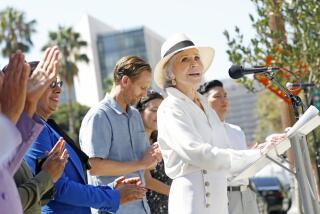Vietnam Is Still a Bad Dream, 19 Years Later
A friend recommended the movie “Born on the Fourth of July,” so I almost saw it. But I didn’t. I started to check out “The Deer Hunter” at a video store but put it back at the last minute. “Apocalypse Now” and “Platoon”--I just can’t watch them.
Hardest of all is “China Beach” on television. It makes too painful the memories of the real China Bay. Its majestic beauty and pure sand shoreline were so anomalous to the ravages of conflict just a few miles away in Da Nang, whose million-plus people had never known a day without war.
It has been 19 years since I left Da Nang, a sprawling mass of refugee compounds in South Vietnam. I was an Army newspaper reporter with a cushy job in an air-conditioned office. I never once saw combat or even a Viet Cong. But for the life of me, I can’t figure out why it still affects me so.
You know people who, years after college, still have nightmares about going to class unprepared for a big test? For 19 years I’ve dreamed the Army wanted me back--and back in Vietnam. A week ago was something of a breakthrough. That dream had me back in Da Nang but as a civilian.
Maybe my anxiety is that the movies will reinforce the empty feeling I’ve always had, that it was all such a waste.
I was at an Army signal battalion compound on the Air Force base. It was 1971 and most of the fighting was over. The only time any of us heard from the Viet Cong was during the once-a-week rocket attacks, usually on Sunday nights. A dozen rockets spread out over the size of the American military base was no more dangerous to us individually than traveling Orange County freeways in a light rain.
The truth is, we actually looked forward to rockets. It was the only thing that brought us together.
Our little compound was an explosive mix of drug dealing, troop irreverence and racial tension. Like many white soldiers, my greatest fear was being in the way of friction between the military brass and the black soldiers.
Few whites were sensitive to the exclusion that so many blacks felt. Not a single officer was black, until finally a black chaplain was brought in near the end of my tour. About the only decent job ever given to a black soldier while I was there was running the motor pool. Most officers did not hide their blatant racism when alone with other whites.
The tension erupted many times into violence, particularly one time after a black leader was sent to prison on charges of selling drugs. I came to dread the darkness--when these incidents occurred.
We built an orphanage, which was a good deed. And some of us made friends with some of the Vietnamese. But everything else was a sick blur of feuding, laughing at the officers’ one-upmanship and wondering just what we were really doing there.
Our drug program was truly straight out of the Marx Brothers, with even the drug counselors toking up with the bad guys who turned themselves in to avoid jail time. Many soldiers, who blamed the poor Vietnamese workers in the compound for their predicament, spent much of their time trying to dog any duties assigned to them. One warrant officer, whose only crime I ever saw was that he loved the Army, paid for his loyalty with a frag exploding against a wall of his room. No one was ever caught. Even worse, few really cared.
So little seemed significant. Too many were too angry to form lasting friendships. Our only common bond was the rocket attacks, which brought us a day or two of community peace with each other.
When I flew out, heading home after my tour ended, the plane was full of cheers. I was overcome with sadness. What the hell had it all been about?
I have tremendous empathy for fellows like Ron Kovic, the true-life central figure in “Born on the Fourth of July.” Kovic and many thousands of others faced so much more than those of us at the Air Force base in Da Nang. But on a smaller scale, we searched for some of the same answers as he.
And maybe, just maybe, one of these days I can bring myself to watch his movie.
* FALL OF VIETNAM
The surrender of Saigon changed many lives forever. A1
More to Read
Only good movies
Get the Indie Focus newsletter, Mark Olsen's weekly guide to the world of cinema.
You may occasionally receive promotional content from the Los Angeles Times.










